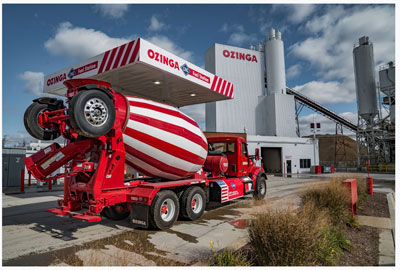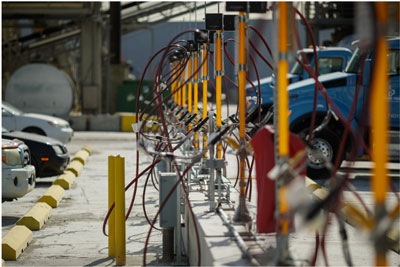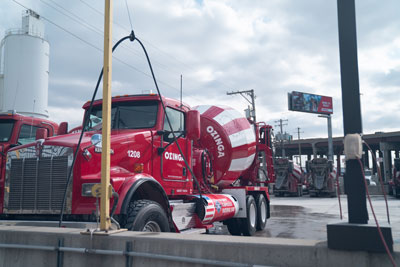Is it time to consider an alternative fuel source for your fleet?
by Craig Yeack

Ozinga RMC, Ozinga Energy



The need for modern infrastructure is absolute and largely relies on ready-mix concrete. It’s in all of our best interests to balance that need with our ability to produce a lighter carbon footprint. But sometimes green advocates lose sight of the unforgiving reality that we also must run profitable businesses. Let’s look at the math of both atmospheric warming and reduced emissions for a mixer fleet and see if we can find a win for both.
A ready-mix truck using 65 gallons of diesel fuel per day will generate approximately 1,450 pounds of carbon dioxide (CO2) versus 1,050 pounds of CO2 if compressed natural gas (CNG) is used. For a 100,000 cubic yard (cy) per year plant with 3.5 turns per day per truck, that works out to 788 short tons of CO2 saved per year (see sidebar). Diesel truck power, using these calculations based on Environmental Protection Agency data, nets 37 percent more CO2 than the CNG alternative.
But wait, there (really) is much more! Natural gas is composed of 70-90 percent methane (CH4) which, when directly released, traps up to 75-100 times more heat in the atmosphere than CO2 within a five-year period. By using renewable natural gas (RNG), ready-mix fleets help process CH4 recaptured from huge emitters such as fracking, landfills and agriculture, into less harmful CO2.
Consider using 10 percent recaptured CH4 for the CNG source at the plant that produces 100,000 cy/year. Assume CH4 would increase atmospheric warming 75x more than CO2 over five years. You have just reduced the impact of roughly 7,500 short tons of CO2 from warming the atmosphere over that period of time.
CLEAN AND COST EFFECTIVE: CONVERTING TO CNG POWER
Great, but is this economically viable? The short answer is yes. The long answer, as always, is more complicated. The economics of CNG have several factors, including the price premium of a CNG system over traditional diesel, fueling time, fuel sources and environmental incentives.
Jeff Bonnema, executive vice president for Ozinga Ready Mix Concrete Inc. in Mokena, Ill., says the added cost to install a CNG system directly from Terex or Oshkosh for front discharge mixers, or to retrofit a rear discharge truck, is around $30,000. The trucks are fitted with tanks for 65 diesel gallon equivalents (DGE), which provide 10 to 12 hours of operation.
Fueling is almost always done overnight and requires the driver to merely attach the connection and go, saving perhaps 15-20 minutes of labor. Compression stations range from $850,000 to more than $2 million depending upon configuration, and it takes about 1 kWh of electricity to compress 139.4 standard cubic feet (scf) of CH4 to 3,600 psi to produce a DGE. Factoring in the cost of CH4, electricity, and a $2 million fueling station (amortized over seven years) the CNG cost equivalent to a gallon of diesel is about $1.95.
In the real world, Bonnema cautions that surge rates for energy and other factors like compression station configuration can drive the real cost up to $2.00 to $2.25 per DGE. Compared to the current average diesel price of around $3.00 per gallon, CNG offers a direct savings of about $0.75 per gallon.
Saving $0.75 per gallon isn’t bad, but it gets better. The U.S. Department of Energy’s Alternative Fuel Excise Tax Credit (https://afdc.energy.gov/laws/319) provides for an additional $0.50 per DGE when alternative fuels are used. Now we have a buck and a quarter to work with, plus any driver labor savings from the refueling process.
For our 100,000 cy/year plant, annual fuel savings from the cost of diesel to DGE ($1.25 per gallon) totals roughly $320,000, or $16,000 per truck. Given the $30,000 upcharge per truck for the 65 DGE CNG system, that puts the break-even point for truck capital at about two years. Over the reasonable 10-year life span of a truck, the net savings for the remaining eight years after break-even for the entire plant is just south of $3 million (subject to the future price differential between diesel and CNG and governmental incentives).
Bottom line, by preventing the annual short-term atmospheric warming by the equivalent of 7,500 short tons of CO2, you reduce the variable costs of energy by $300,000-plus per year. CNG for mixers has the very real potential to put you on the green side of the environment and the green side of profitability.
CNG vs. DIESEL FUEL
Let’s do the financial and carbon dioxide math. For the purposes of this article, we are looking at plant operations in round numbers to illustrate the economic and environmental impact of switching a ready-mix truck fleet from diesel to compressed natural gas fuel.
If a plant…
- Produces 100,000 cy/year
- With 7.25 cy per load
- Averaging 3.5 turns per truck, per day
- With 20 trucks available
Then CNG fuel with 10 percent renewable natural gas (RNG) …
- Emits 7,500 fewer equivalent tons of CO2 per year
- Reduces direct CO2 emissions nearly 40 percent over diesel
- Saves $1.25 per gallon
- Totals $300,000-plus savings per year

Craig Yeack has held leadership positions with both construction materials producers and software providers. He is co-founder of BCMI Corp. (the Bulk Construction Materials Initiative), which is dedicated to reinventing the construction materials business with modern mobile and cloud-based tools. His Tech Talk column—named best column by the Construction Media Alliance in 2018—focuses on concise, actionable ideas to improve financial performance for ready-mix producers. He can be reached at [email protected].